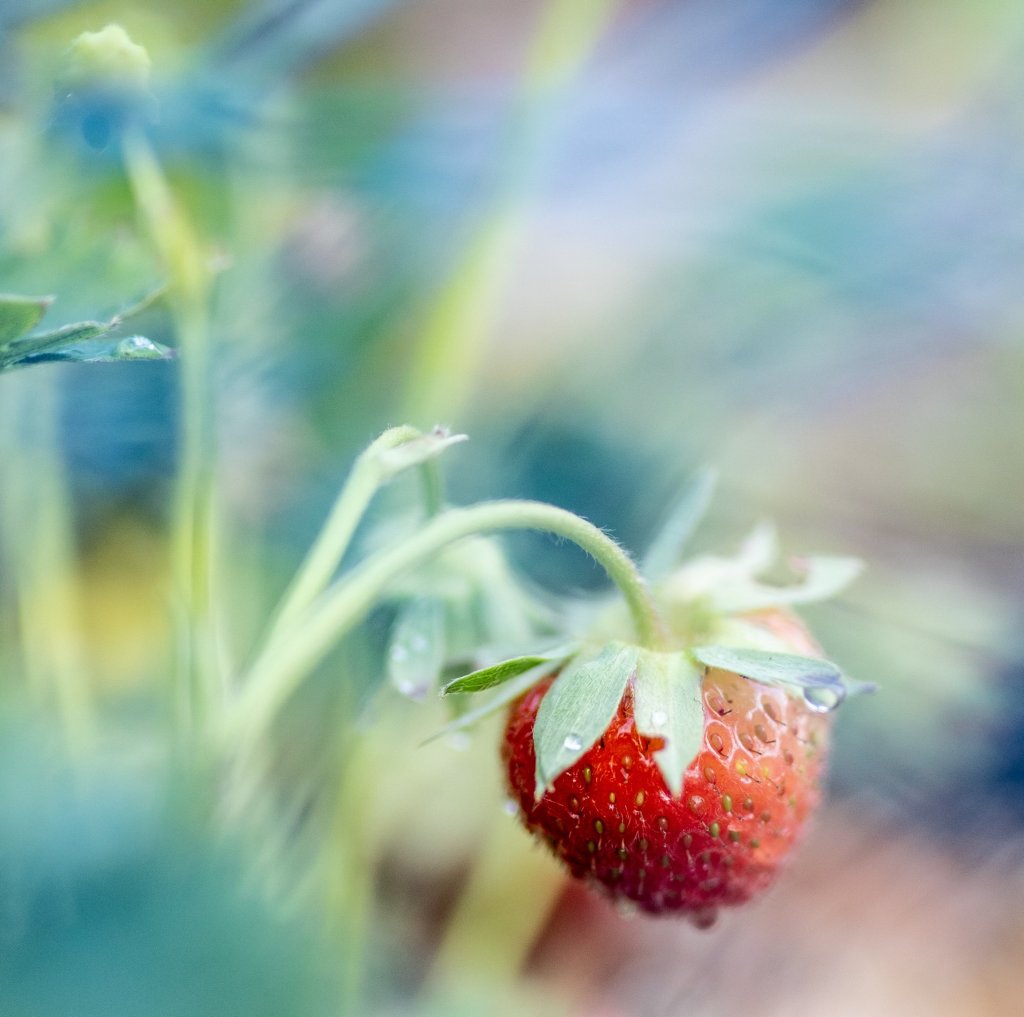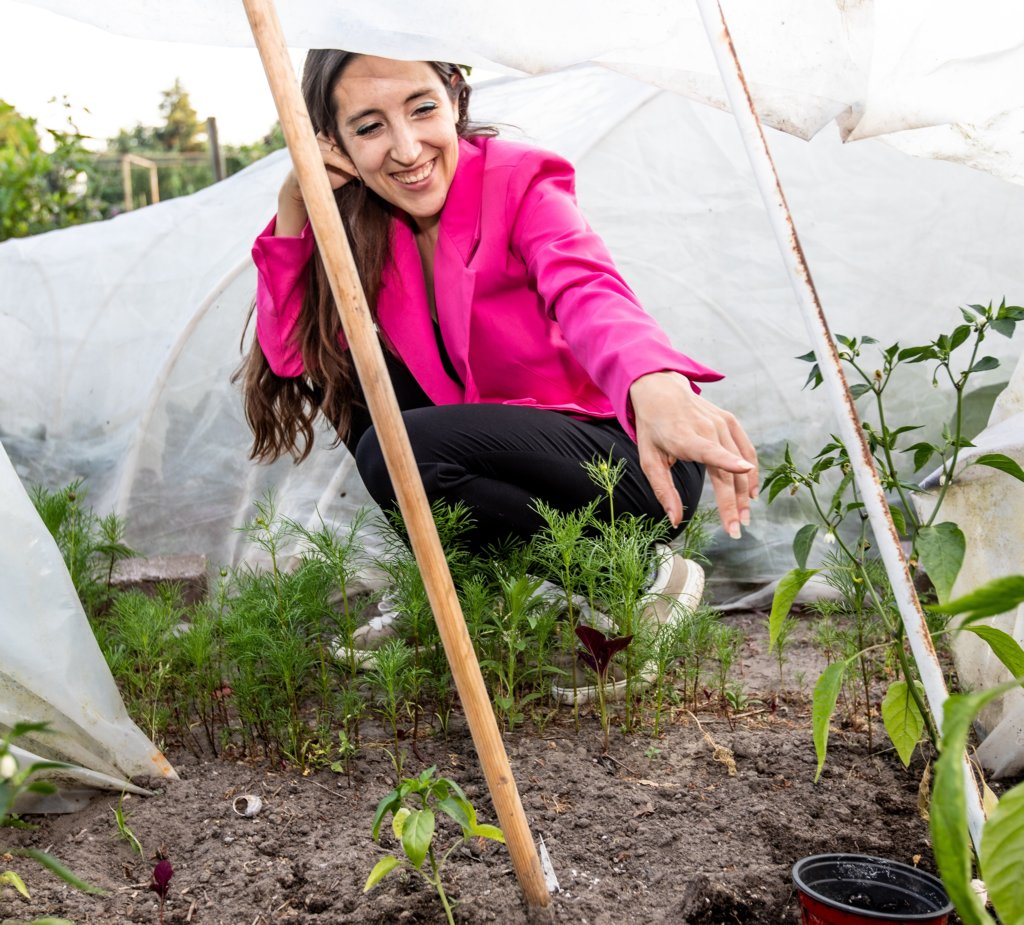The major societal problems of our time require an approach that transcends scientific disciplines. This often means that people from one discipline collaborate with colleagues from other disciplines. Femke van Beek (TU/e), Guido Camps (WUR) and Caroline Figueroa (TUD) take a different approach: they unite multiple disciplines within themselves, forming bridges between robots and nature, food and artificial intelligence, and mental health and digital technology.
Text: Sonja Knols
Images: Dieuwertje Bravenboer
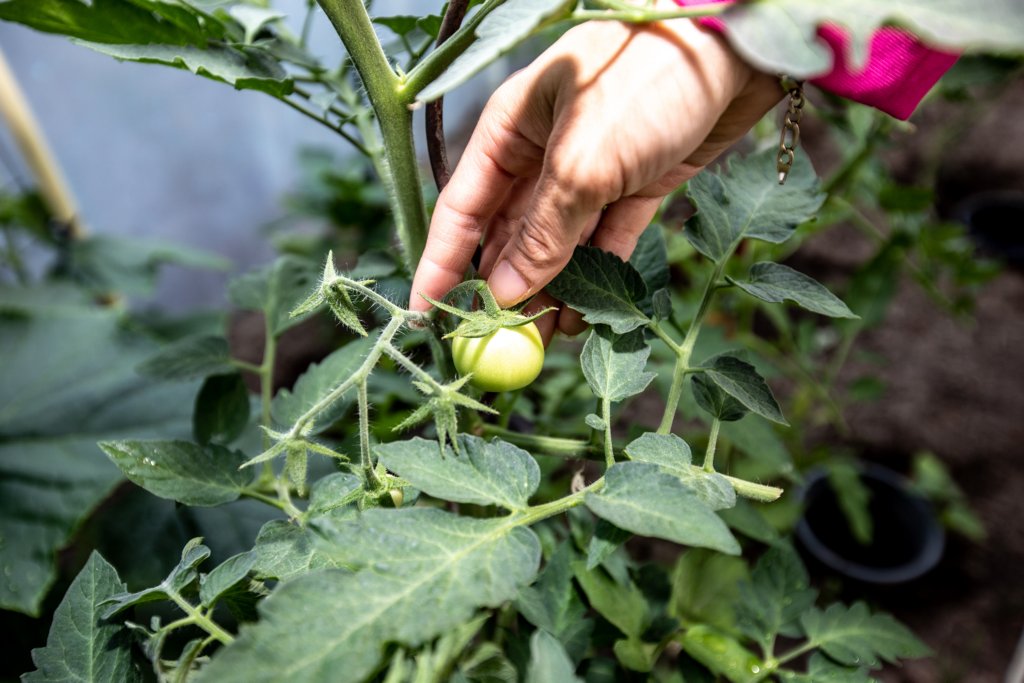
FvB = Femke van Beek
GC = Guido Camps
CF = Caroline Figueroa
From early on in your careers, you didn’t choose the standard routes. How did that come about?
FvB: ‘That wasn’t really a conscious choice, it just happened that way. During my biology studies at WUR, I did an internship in Sweden, where I worked on visual systems and information processing in animals. One of the colleagues there wanted to start a new group in Bonn, for which I had already received a personal grant for a PhD. Unfortunately, that group was never realized. However, by then, I was convinced that I wanted to do a PhD on a perception-related topic. Eventually I ended up in Human movement Sciences, for a PhD project on haptic perception. With that topic, I entered Oculus Research (now Facebook Reality Labs), where for several years I worked as the sole perception scientist in a team that included mechanical engineers, electrical engineers, and materials scientists. When I wanted to return to the Netherlands, I managed to secure a postdoc position at TU/e within the 4TU Soft Robotics program. Currently, I still work at that university, but now as a tenure tracker within the Green Sensors program.’
GC: ‘The short answer is that I can’t and won’t choose. That was already the case in high school, where I took final exams in ten subjects, ranging from History to Mathematics B. My choice for the broad education of the University College at Utrecht University was therefore a logical one. There the emphasis was on learning how to debate, which led me to set up a communications agency for coaching and training in that area. That work enabled me to continue studying for a long time. After studying artificial intelligence in Nijmegen, I studied veterinary medicine and worked as a veterinarian for a while, because that has always been a kind of childhood dream of mine. But I wanted to go more in-depth, and when a PhD position came up in Wageningen in the field of MRI and physiology, for which they were also looking for someone who had a knack for computers, it was right up my alley. And I turned out staying there.’
CF: ‘My medical studies were working towards a clear goal: I wanted to become a psychiatrist. Already during my studies I discovered that I found research very interesting, which I confirmed during an internship at the University of Oxford where I studied the influence of antidepressants on brain activity. After this, I applied for a personal fellowship to be able to combine my fellowships with research in neuroscience at the AMC (Amsterdam). Then I moved more toward engineering and focused on using technology to promote mental health. I wanted to apply that knowledge to the clinic. The plan was to combine my clinical training with research, but when I was about a year and a half into the psychiatry program, I decided I wanted more time for research and teaching. That’s when I applied for my current position as an associate professor in Digital Health at TU Delft. As a tenure tracker, I work within 4TU.REDESIGN on food systems of the future, and how we can use technology to get healthy food to consumers.’
How does your multidisciplinary background help you in your research?
GC: ‘My broad background benefits me every day. In my current work, my knowledge of artificial intelligence, my background in veterinary medicine and my experience in project management from my communications agency all come together. With my background as a veterinarian, I can perfectly relate to virologists or epidemiologists, for example. And my knowledge of information science and artificial intelligence enables me to talk to a software engineer about tracker technology moments just as easily. In the Netherlands, we choose to specialize early on. But I believe in so-called T-shaped skills: a broad base, from which you can go in-depth on a particular subject. For some subjects, a super-specialization works very well, but in a field like nutrition, diverse disciplines such as epidemiology, physiology, statistics, and psychology all come together. It helps tremendously if you have a solid basic knowledge in all of those areas.’
FvB: ‘The complex societal challenges we face require a team effort. And in a team, besides the experts in a particular field, you always need a few generalists to understand the big picture. It is also true that you will look differently at your own field if someone from a different background asks you questions about it. That is enriching for both sides.’
Is there any downside to not fitting any disciplinary mold?
FvB: ‘In my experience, it can be difficult to get into engineering as a generalist. Take an appointment advisory committee: it rarely includes people who have a natural fit with the knowledge I bring. In addition, when you start out, it is sometimes a bit of a search for both parties how to come into your own, for example when it comes to the subjects you can teach.’
GC: ‘I experience many more advantages than disadvantages. But if I have to mention something: traditional academic journals are still largely discipline specific, especially the top journals. So what I sometimes run into is that our work is too technical for a top journal in nutrition, but too nutritional for a top journal in engineering. Also, calls for research programs are rarely tailored exactly to my field. My advice is therefore not to wait for the ideal call; it doesn’t come. If something comes along that may not exactly have your interest, but you see opportunities to build something new that you can eventually bend in your desired direction, jump on it.’
FvB: ‘Being open to your colleagues is indeed the most important thing as far as I’m concerned. Ask questions and get an idea of what is happening and how your work fits in. For me, it has always helped to start fabricating a piece of hardware as soon as possible. On the basis of such an object, you can then start the conversation with others and show what you actually do.’
Do the 4TU programs also have a role in that?
FvB: ‘My postdoc appointment within the Soft Robotics program coincided with COVID-19. As a result, the lab visits we had planned to organize unfortunately were cancelled. But we did manage to build the planned joint demonstrator of a teleoperation system, which combines technologies from the various universities involved. Such a joint, concrete end goal helped enormously in building a community of people with expertise in soft robotics. After all, if you’re going to build something together, you have to really understand each other. You start asking deep, practical questions about what choices were made and why and how that fits in with your own piece of the design. That way you help each other out for other research as well. For example, we exchanged a technique for making silicone with each other.’
GC: ‘As a researcher working on socially relevant problems, you should talk as much as possible with people who are working on completely different things. That is much easier in broadly oriented programs, such as the 4TU programs. Young researchers can quite easily engage in serious conversations and exchange ideas. Having said that, collaboration within 4TU contexts can also be challenging. That’s because schedules are not aligned, funding structures can differ, and you sometimes have to deal with conflicting protocols when it comes to data sharing.’
Do you have any tips for students or researchers who also want to broadly develop themselves?
GC: ‘You should not sink too deeply into your own silo, but talk to people who are working on completely different things, that keeps you fresh and alert. Keep asking yourself what you are actually doing it all for, and what your next step could be. And make sure that when you start something new, you make appointments as soon as possible and actually start doing something, before you get absorbed in organizational matters.’
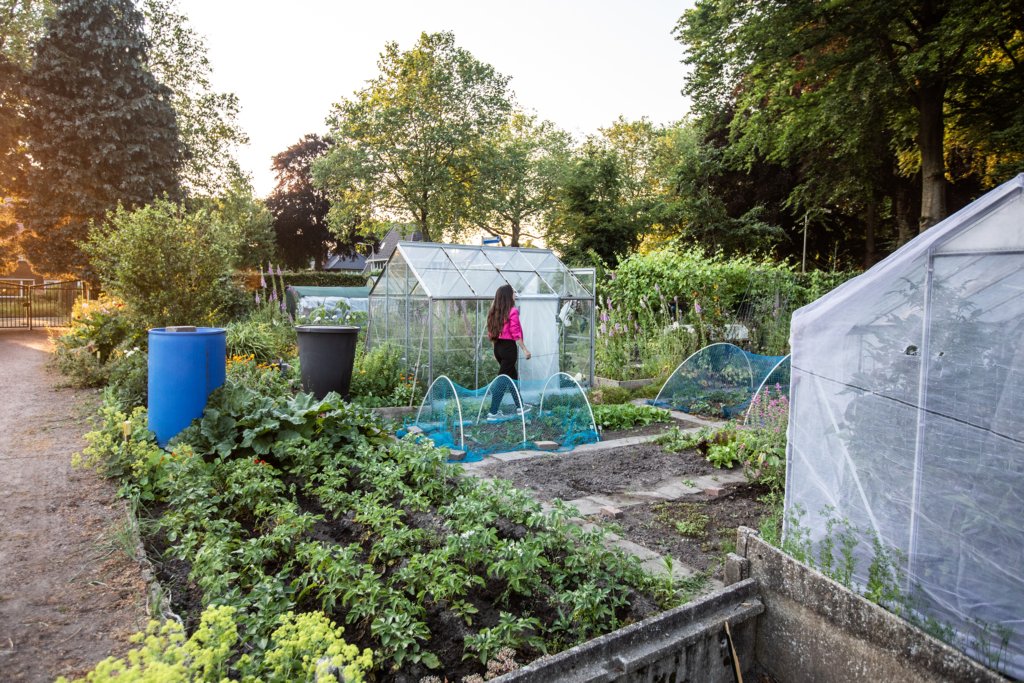
CF: ‘Realize that finding your own way off the beaten path is a process that takes time. Try things out, even if it’s hard sometimes. In retrospect, every step has provided me with new insights, even when in the end, another direction turned out to be better. If you get the chance, try working in different environments, such as different departments, research areas, or countries. Doing research in England and the U.S. gave me unique insights and a network that still benefits me a lot today. Each new environment brings you a new perspective on your field and on your own development in it. It sometimes takes courage to do something different, but the rewards can be great.’
FvB: ‘You end up learning the most by just doing something, and discovering in practice what is the right direction for you. And although it may not always seem that way at the time, your student days are the time to try out different things. For example, I myself have done summer internships with companies. A company likes it when someone comes in, and it is an easy way for you to gain different experiences. This can also be done during your doctoral research. For example, I know that Facebook has special projects for PhD students. And in general: if something nice comes along, just say yes. You rarely regret it.’
About HTSF
The goal of the High Tech for a Sustainable Future (HTSF) programme is to stimulate structural and sustainable collaborative theme-oriented research between the four technical universities on topics that require 4TU collaboration and for which it is currently more difficult to acquire funding externally (i.e. new or high risk topics). The societal relevant research programmes attract and develop new and diverse talent for the four TU’s -among others 63 Tenure Trackers- and aim to deliver societal impact through scientific breakthroughs. After a funded start-up period of five years, research should continue without 4TU.Federation funding.
In 2018 the first round of HTSF programmes started. Now, after five years, they are ready to continue independently and make room for the new HTSF programmes to start. A total of €20 million has been made available for the four new HTSF programmes.




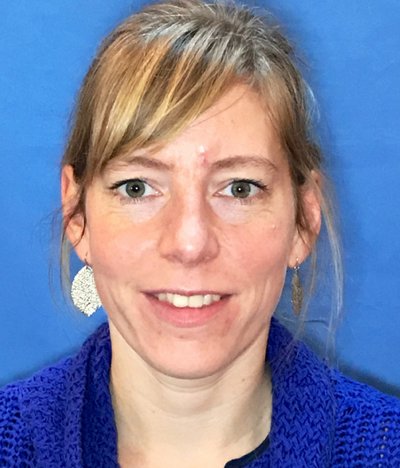
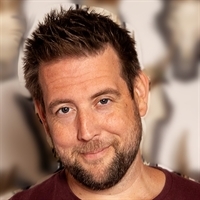
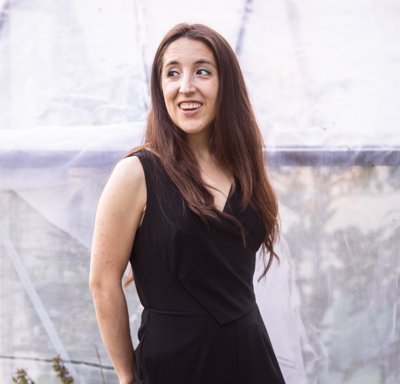 HIGHLIGHTED | CAROLINE FIGUEROA
HIGHLIGHTED | CAROLINE FIGUEROA 